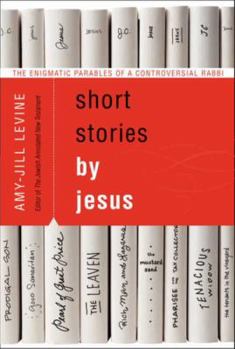Short Stories by Jesus: The Enigmatic Parables of a Controversial Rabbi
Select Format
Select Condition 
Book Overview
The renowned biblical scholar, author of The Misunderstood Jew , and general editor for The Jewish Annotated New Testament interweaves history and spiritual analysis to explore Jesus' most popular teaching parables, exposing their misinterpretations and making them lively and relevant for modern readers. Jesus was a skilled storyteller and perceptive teacher who used parables from everyday life to effectively convey his message and meaning. Life in first-century Palestine was very different from our world today, and many traditional interpretations of Jesus' stories ignore this disparity and have often allowed anti-Semitism and misogyny to color their perspectives. In this wise, entertaining, and educational book, Amy-Jill Levine offers a fresh, timely reinterpretation of Jesus' narratives. In Short Stories by Jesus , she analyzes these "problems with parables," taking readers back in time to understand how their original Jewish audience understood them. Levine reveals the parables' connections to first-century economic and agricultural life, social customs and morality, Jewish scriptures and Roman culture. With this revitalized understanding, she interprets these moving stories for the contemporary reader, showing how the parables are not just about Jesus, but are also about us--and when read rightly, still challenge and provoke us two thousand years later.
Format:Hardcover
Language:English
ISBN:0061561010
ISBN13:9780061561016
Release Date:September 2014
Publisher:HarperOne
Length:320 Pages
Weight:1.10 lbs.
Dimensions:9.1" x 6.1" x 1.2"
Customer Reviews
1 rating
Good concept - poor delivery.
Published by Scott , 1 year ago
I picked up this book to supplement recent Torah study (utilizing the excellent ArtScroll Tanach series) and N.T. Wright reading. I liked the concept of the book, as I have found that the more Judaism I learn, the more my Catholic faith “comes alive”. As Brant Pitre likes to say “If you don’t understand why Catholics do something, it’s because we got it from the Jews”.
That said, I found the book terribly difficult to read. It is by no means technically difficult (the intended audience is much closer to a “popular audience” than scholarly), but the problem is the tone of author. I find her constant insults, negativity, sarcasm, and complaints of men/society overwhelming. I would have thought that she’d write a book that charitably said “here is how I think a first century Jew would understand this parable”, but instead tries just as hard to belittle the (mostly) Protestant interpretations and interpreters themselves. Having never heard many of these Protestant interpretations myself, I certainty found myself doing “double takes” while reading them, but that is not an excuse to not be charitable in helping somebody understand the parables.
The author seemingly contracts herself in the book as well. She talks about the important of applying parables to modern day, but then utterly rejects any allegorical readings of scripture. Allegory is but one method to apply a parable to a later time/place. The N.T. itself is a re-capitulation of the O.T., so understanding the parables by overlaying biblical events is not unreasonable. Are they likely to be the original understanding? Maybe not! And that’s all she needed to say on the topic, but [she admittedly] is the type of person who has no problem throwing punches and “making people feel uncomfortable”.
Just as Jews have multiple ways of interpreting scripture, so do Catholic/Orthodox. I think the book would have been a whole lot better if the author ignored [later] scriptural interpretations, and kept the focus on perceived pre-AD 33 Judean interpretations.






